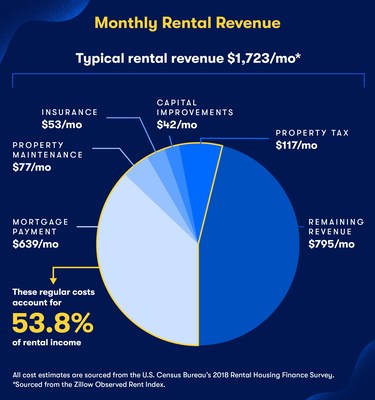Missed Rent Payments May Balloon as Boosted Aid Expires, Holding Potential for Deep Scars in the Rental Market
As government unemployment aid expired, 22.6% of U.S. apartment households missed rent payments in early July, a rise from 19.2% in June. This increase poses risks of housing insecurity for both renters and rental property owners. By July 13, the percentage of unpaid rent dropped to 12.4%, but was still notably higher than last year. The pandemic has significantly affected the rental market, with rent prices slowing and the average return on rental units falling to 6.4% from 13.3% in 2015. Analysts warn of potential financial instability as missed payments could ripple through the rental ecosystem.
- None.
- 22.6% of U.S. apartment households did not pay rent in early July, up from 19.2% in June.
- Potential for significant rise in unpaid rent as government aid has expired.
- The average annual return on rental units has decreased to 6.4%, down from 13.3% in 2015.
- Increased financial hardships for renters and small landlords could lead to wider market instability.
Insights
Analyzing...
SEATTLE, Aug. 5, 2020 /PRNewswire/ -- As 32 million Americans received unemployment benefits in late Junei, more renters were late on their July payments than any other time during the coronavirus pandemic. Boosted government unemployment aid has expired, meaning those numbers are likely to rise even further in coming months. Those missed rent payments could cause a wave of housing insecurity and have the potential for deep impacts not only for renters, but also for rental owners who owe common costs of property ownership and other workers in the industry.
During the first week of July,
Much of that aid expired at the end of July, edging toward the possibility of a fiscal cliff that could cause unpaid rent figures to rise significantly in the coming months, barring a dramatic recovery in the job market. That is expected to have severe consequences for renters who are missing all or part of their paychecks, and has the potential to start a ripple effect felt by many others who rely on the rental industry.
"The rental market has been more affected by the coronavirus pandemic than the for-sale side appears to have been. The steady climb of the past few years has come to an end as rent growth has slowed nationally and prices have outright fallen in a few markets," said Zillow economist Joshua Clark. "The saving grace has so far been government aid and eviction freezes, which have provided a lifeline for those who are out of work. But much of that aid has expired, putting many renters and workers who rely on the rental market continuing apace in a vulnerable position."
Rent prices have slowed during the coronavirus pandemic, but likely not enough to provide any real relief for renters who are missing paychecks. The typical rent in the U.S. has fallen
For landlords, most of that potential rental income is absorbed by common costs of property ownership. More than half (
That's before accounting for other costs of running a rental business like staff wages or management company costs, business taxes, legal and accounting services, landscaping, and more. In total, the average annual return on a rental unit is
"For property management companies, rental payments support things like wages for team members, maintenance, unit and amenity upgrades, all the way down to the systems that allow a business to manage their operations," said Brian Miller, director of marketing at Berger Rental Communities. "Tenants and landlords are of course affected when payments are missed, and taking it a step further the partners we work with all have individuals that rely on companies like ours operating as we have been. So there are plenty of pieces of a larger ecosystem that are feeling an impact."
Widespread missed payments with many renters facing major financial hardships could have far-reaching effects. That's especially true for smaller landlords, who may have bigger per-unit margins because of their typically lower variable costs, but may also be less able to withstand missed income from a vacant unit or a renter unable to pay because they don't have the safety net provided by owning several units.
"This is an incredibly stressful time for so many, especially when it comes to people's homes, the place we go to be safe," said Rachel Briseño Bruno, a San Antonio-based Realtor who also owns rental properties and a property management company. "Many landlords we work with own one or two properties as an investment for retirement or a child's college fund, and they are on the hook for mortgage payments on those homes. Losing just one tenant who may have lost a job and moved back home or in with a friend can have an enormous impact."
About Zillow
Zillow, the top real estate website in the U.S., is building an on-demand real estate experience. Whether selling, buying, renting or financing, customers can turn to Zillow's businesses to find and get into their next home with speed, certainty and ease.
In addition to for-sale and rental listings, Zillow Offers buys and sells homes directly in dozens of markets across the country, allowing sellers control over their timeline. Zillow Home Loans, our affiliate lender, provides our customers with an easy option to get pre-approved and secure financing for their next home purchase.
Millions of people visit Zillow Group sites every month to start their home search, and now they can rely on Zillow to help them finish it — with the same confidence, ease and empowerment they've come to expect from real estate's most trusted brand.
Zillow is owned and operated by Zillow Group, Inc. (NASDAQ:Z and ZG).
i U.S. Department of Labor, Unemployment Insurance Weekly Claims: https://www.dol.gov/sites/dolgov/files/OPA/newsreleases/ui-claims/20201406.pdf
ii National Multifamily Housing Council, Rent Payment Tracker: https://www.nmhc.org/research-insight/nmhc-rent-payment-tracker/
iii U.S. Census Bureau, Household Pulse Survey, Week 12: https://www.census.gov/householdpulsedata
iv Estimates based on the median cost per unit per year listed in the U.S. Census Bureau's 2018 Rental Housing Finance Survey: https://www.census.gov/programs-surveys/rhfs.html. The median mortgage payment calculation is based on a loan duration of 30 years, with a median interest rate of
v National Council of Real Estate Investment Fiduciaries: https://www.nmhc.org/research-insight/quick-facts-figures/quick-facts-investment-returns-on-apartments/#cap_rate
![]() View original content to download multimedia:http://www.prnewswire.com/news-releases/missed-rent-payments-may-balloon-as-boosted-aid-expires-holding-potential-for-deep-scars-in-the-rental-market-301106331.html
View original content to download multimedia:http://www.prnewswire.com/news-releases/missed-rent-payments-may-balloon-as-boosted-aid-expires-holding-potential-for-deep-scars-in-the-rental-market-301106331.html
SOURCE Zillow








